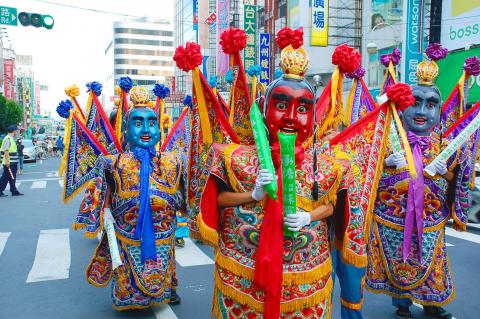A group of civic organizations yesterday began a series of protests against the opacity of the recently signed cross-strait service trade agreement, asking the government to scrap the agreement and renegotiate with China over the terms of the pact.
“President Ma Ying-jeou’s (馬英九) government did not consult with any industries or the legislature before signing the agreement,” Democratic Progressive Party (DPP) Chairman Su Tseng-chang (蘇貞昌) told the rally held in Taipei.
“Industries I spoke to all said they are worried about the negative impacts there may be as a result of the signed agreement, and yet Ma keeps saying that ‘certain political parties and media’ are exaggerating negative consequences of the service pact,” he said.

Photo: Lee Lee-fa, Taipei Times
As governing and opposition lawmakers have reached a consensus to review the cross-strait service trade agreement during an extraordinary legislative session slated to take place beginning on Tuesday, the DPP will insist that the legislature screen the pact item-by-item, he added.
National Taiwan University economics department chairwoman Jang Show-ling (鄭秀玲) said in a video shown at the rally that the Ma administration violated three principles in signing the cross-strait service trade agreement.
The signing lacked transparency throughout the process, it put commercial interests ahead of national interests by opening air, sea and land transportation and communication industries to China and the agreement is unequal, she said.
Saying the pact would only benefit big business and damage small and medium-sized enterprises and their workers in the service sector, Jang called for the government to renegotiate the pact with China.
Former Examination Yuan president Yao Chia-wen (姚嘉文), one of the conveners of the series of protests which the groups plan to stage over the next seven days, voiced concerns that when Chinese businesses establish themselves in Taiwan, not only industry, but national security would be affected.
In addition to the rally yesterday, a protest organized by groups such as the Cross-Strait Agreement Watch, Taiwan Democracy Watch and the Taiwan Labor Front will take place in front of the Legislative Yuan tonight.

UKRAINE, NVIDIA: The US leader said the subject of Russia’s war had come up ‘very strongly,’ while Jenson Huang was hoping that the conversation was good Chinese President Xi Jinping (習近平) and US President Donald Trump had differing takes following their meeting in Busan, South Korea, yesterday. Xi said that the two sides should complete follow-up work as soon as possible to deliver tangible results that would provide “peace of mind” to China, the US and the rest of the world, while Trump hailed the “great success” of the talks. The two discussed trade, including a deal to reduce tariffs slapped on China for its role in the fentanyl trade, as well as cooperation in ending the war in Ukraine, among other issues, but they did not mention

Japanese Prime Minister Sanae Takaichi yesterday lavished US President Donald Trump with praise and vows of a “golden age” of ties on his visit to Tokyo, before inking a deal with Washington aimed at securing critical minerals. Takaichi — Japan’s first female prime minister — pulled out all the stops for Trump in her opening test on the international stage and even announced that she would nominate him for a Nobel Peace Prize, the White House said. Trump has become increasingly focused on the Nobel since his return to power in January and claims to have ended several conflicts around the world,

CALL FOR SUPPORT: President William Lai called on lawmakers across party lines to ensure the livelihood of Taiwanese and that national security is protected President William Lai (賴清德) yesterday called for bipartisan support for Taiwan’s investment in self-defense capabilities at the christening and launch of two coast guard vessels at CSBC Corp, Taiwan’s (台灣國際造船) shipyard in Kaohsiung. The Taipei (台北) is the fourth and final ship of the Chiayi-class offshore patrol vessels, and the Siraya (西拉雅) is the Coast Guard Administration’s (CGA) first-ever ocean patrol vessel, the government said. The Taipei is the fourth and final ship of the Chiayi-class offshore patrol vessels with a displacement of about 4,000 tonnes, Lai said. This ship class was ordered as a result of former president Tsai Ing-wen’s (蔡英文) 2018

GLOBAL PROJECT: Underseas cables ‘are the nervous system of democratic connectivity,’ which is under stress, Member of the European Parliament Rihards Kols said The government yesterday launched an initiative to promote global cooperation on improved security of undersea cables, following reported disruptions of such cables near Taiwan and around the world. The Management Initiative on International Undersea Cables aims to “bring together stakeholders, align standards, promote best practices and turn shared concerns into beneficial cooperation,” Minister of Foreign Affairs Lin Chia-lung (林佳龍) said at a seminar in Taipei. The project would be known as “RISK,” an acronym for risk mitigation, information sharing, systemic reform and knowledge building, he said at the seminar, titled “Taiwan-Europe Subsea Cable Security Cooperation Forum.” Taiwan sits at a vital junction on